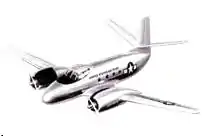Beechcraft XT-36
The Beechcraft XT-36 (company designation Model 46) was an American twin-engine trainer-transport aircraft project of the early 1950s. Due to a change in requirements, the project was cancelled before any examples of the type were built.
| XT-36 | |
|---|---|
 | |
| Role | Trainer-transport |
| National origin | United States |
| Manufacturer | Beechcraft |
| Status | Cancelled |
Design and development
The XT-36 was intended for use in both trainer and transport roles. It utilised a low-wing design, with twin Pratt & Whitney R-2800 radial engines providing power; the design specified a pressurized cabin, capable of carrying either an instructor and three students in the training role, or two crewmembers and up to twelve passengers in a transport configuration.[1] Top speed was expected to be around 350 miles per hour (560 km/h) at over 30,000 feet (9,100 m).[2] The aircraft was intended to become a standard United States Air Force type,[2] as well as licensed production being set up by Canadair as the CL-15.[3][4]
The project was started in 1951, with the rising demand for new aircrew due to the Korean War, Beechcraft was awarded a contract for the construction of the type, and built a new assembly plant for the production line.[5] Orders totaled 193 aircraft; Canadair was contracted for 227 examples. However, in 1953, shortly before the first flight of the prototype was to occur,[6] changing priorities resulted in the cancellation of the program.[7]
Variants
- XT-36A
- Military designation for Beech Model 46 trainer for the USAF; prototype completed but not flown.
- CL-15
- Licensed production by Canadair.
Specifications (estimated)
Data from The Beechcraft T-36[2]
General characteristics
- Crew: two to four
- Capacity: 12 passengers
- Wingspan: 70 ft (21 m)
- Gross weight: 25,000 lb (11,340 kg)
- Powerplant: 2 × Pratt & Whitney R-2800 radial piston engines, 2,300 hp (1,700 kW) each
Performance
- Maximum speed: 350 mph (560 km/h, 300 kn)
- Cruise speed: 300 mph (480 km/h, 260 kn)
- Range: 650 mi (1,050 km, 560 nmi)
- Service ceiling: 34,000 ft (10,000 m)
See also
Aircraft of comparable role, configuration, and era
- T-7 Navigator
- T-29 Flying Classroom
Related lists
References
- Notes
- Ball 1995, p.143.
- "The Beechcraft T-36. Flight, 4 January 1952, p.20.
- Air Pictorial and Air Reserve Gazette, Volume 20. Air League of the British Empire, 1958. p.395.
- Howe 1952, p.22.
- Hamlin 1952, p.77.
- Murphy 2003
- "The U.S.A.F. Budget and Canada". The Aeroplane, Volume 85, 1953. p.162.
- Bibliography
- Ball, Larry (1995). The Immortal Twin Beech. Brule, WI: Cable Publishing. ISBN 978-0964151420.
- Hamlin, Fred (1953). The Aircraft Year Book 1952. Dallas, TX: Lincoln Press. ASIN B000E8DIX4.
- Howe, C. D. (August 1952). "Canada on Guard". The Rotarian. Chicago: Rotary International. 81 (2).
- Murphy, Daryl. "The Beeches that got away". Planes & People. Wings over Kansas, 2003.